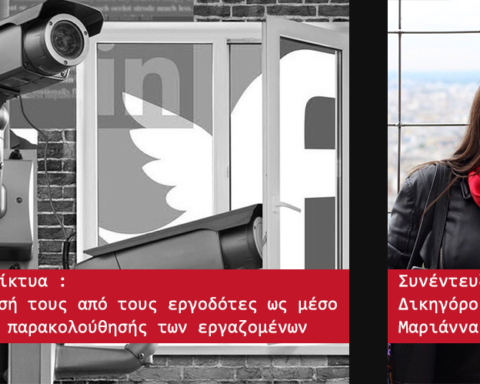Interview by Amanda Patsopoulou
Translation by Tina Barbatsalou
Here you can find the original interview in Greek
Αfter collecting 29 years and some thousand travel miles in their backpack and meeting hardcore fans all over the world, Rotting Christ are the most independent presence of the Greek metal scene. We met two of the band’s members, SakisTolis (vocals, guitar) and Giorgos Emmanuel (guitar) in the cozy environment of a recording studio, while we were trying to comprehend the nature of being a professional musician and devote yourself to the art you are passionate with. We discussed about so many things and if you pay attention to all of them and happen to attend their next live, you ‘ll feel closer to them than ever.


Loving music and using it as a means of expression is a profession for some people. However, it is a path that only few will take. How do you make such a decision, i.e. becoming fully devoted to your beloved art, no matter the consequences?
Sakis: Apparently, this is not a decision that you make in one day. It is actually away of life. I still recall that during the tough times of the ‘90s, when everyone in Greece wanted to get a job in the public sector (public sector employees in Greece was the top paid job in the ‘90s and early ‘00s), I said that I would follow my path and push it to the limit. It’s true that I was diving into insecurity, despite the fact that Greece was supposedly in a development track at the given period. When everyone had a professional orientation, I even gave up studying in the Technological Institute I was subscribed and even avoided joining the obligatory military service. I gave up literally on everything in order to pursue my vision.
Was that decision scaring (the shit out of) you?
Sakis: Definitely yes. When everyone was choosing a stable job in order to have a salary, I didn’t even have pocket money. I’ve been spending my time on the road, hoping for a tour so as to play for free food!
Have you met people who also shared the same passion but they finally gave up on it?
Sakis: Oh, hell, too many! However, this usually ends unexpectedly from your parents and family. You see, they are wondering how this story will go and they often discourage you. You need to be strong, but not a romantic fool. On the contrary, you have to drop down to earth and start getting real. You need to know that if, for example, you want to become an astrophysicist in the near future, this will not happen because you gave up on your education. If you want to make your dreams come true, you have to be reasonable. Your goals have to be realistic. Personally though, I’m not such a follower of this trend. I’m quite an impulsive person, because I believe that we only live once and it’s worthy to take risks for the things that we are passionate about.
Giorgos:Right at the break of dawn of R.C., even before our first actual tour, Sakis and Themis boarded on a train and travelled around Europe. They just wanted to interact with other people, get introduced to new cultures and attend concerts; things that at the time being, were kinda risky. It was as if you decided to jump from the seventh floor of a building and saying: “I’ll stand on my feet”.
Sakis: If you asked me, I would add something more. If I could turn back time, I’m not sure that I would have done the same thing. In other words, I wouldn’t enjoy it so much if my child would take the same initiative, taking into account the current socio-political circumstances. If in the future my daughter tells me that she found a job with a “stable” salary, I’ll actually be happy. It wouldn’t be the same if she told me that she joined a band and she wanted to make a living out of this. Unfortunately, times have changed.

Did you ever have to do another, non-music related job so as to make a living until now? If yes, what kind of job was it? Did it offer something more to your music mentality?
Sakis: Truth be told, I’ve done some jobs that were not even closely related to music. The only slightly similar job I had was when I was an employee at a store selling CDs. Unfortunately, irrelevant jobs don’t have something more to offer to your music mentality. They just give you more chances to survive and some money to invest in music. I kept working in irrelevant jobs till my late 20’s. My father was a construction worker and I used to help him for some pocket money. I was also returning books for a living. Part-time jobs were only a means to keep my goal alive.
Giorgos: When I was still a schoolboy, I used to work as a distributor. Afterwards, I only volunteered in studio- and music- related tasks. If I earned something, it was always dedicated to attending music classes or purchasing equipment.
So, you never thought about quitting music and getting a “normal” job?
Giorgos: No, not for a single moment.
Sakis: Seriously, I never thought about it. I had some random thoughts every now and then, but I never reached that conclusion.
The extreme metal music scene is not a concept that is easily digested by everyone. What is the message that you are trying to send to the people? Which is the kind of influence or awakening you would like to achieve through your music?
Sakis: On the one hand, I’m really fond of using your music in order to send a message. On the other hand, I’m not a fan of proselytism and conversion. I neither like violence, nor forcing, i.e. acting because I ordered you to do so. I just think that some of our actions influence teens and young adults and that makes me happy. I’m a true supporter of actions instead of words. Many people talk round the clock, discuss philosophical issues, but they truly suck when it comes to decision-making. That’s why I try to act a lot instead of talking a lot. Telling people to “follow their dreams” would mean nothing to me. However, if individuals see me following my own dreams, they would actually be influenced and affected. That’s why I’m also affected by “doers”, because they are the only ones worthy of your attention.
You have chosen a way of expression –maybe a way of life as well-, which is highly correlated to your music and may shock the average Joe. How would you describethe Greek average Joe and how do you react to the conservative reactions to your work?
Sakis: Currently we have friends who face way more serious problems than the reaction of a random average Joe. Things were worse in the past. During the 80’s and the 90’s, we could even be arrested. You really need to man up of you want to cope with these things. However, this is a hard bet to win after a certain age. Especially after your 40’s, not giving importance to what others say, is a continuous test. Tbh, sometimes I enjoy their frenzy. In the very end, I’m also an average Joe but I don’t follow their principles.
Are Greek people still prejudiced with the black metal scene?
Sakis: Greece is a stereotype paradise and that isn’t limited to black metal or metal music as a whole. Every group of people with a specific trait has haters in another group and this isn’t going to end well.
Your motto is: non serviam! What is that you consider submission and when do people lose their own freedom?
Sakis: Clearly when the freedom of the spirit is lost. Our everyday lives are a proof that we certainly have lost a part of our freedom! Being an employee, having to pay bills, social security, taxes and who knows what else, it already signifies that your freedom is long gone. We should at least feed our spirit, because it’s the only thing we have left. This is the exact meaning of “non serviam”.
After traveling almost everywhere in the world, you’ve been introduced to different cultures and social schemes. What, in your opinion, that exists in Greece doesn’t exist anywhere else and the contrary?
Sakis: A unique trait of Greece is filotimo (the love of honor, a word that can’t be directly translated. It is mostly about respect and doing the right thing. In its simplest form it means “doing good”, and it ensures your behavior will make you stand out from others. It will demonstrate what kind of a person you are and the manner in which you were brought up). We have a bit of sun, a bit of sea, but we also have a serious lack of education in the broad term. I’m not referring to whether children are studying or not, but to the fact that new generations grew up with the mentality of caring about themselves as individuals and about no one else.
Giorgos: I have nothing more to add, Sakis said pretty much everything.
Which are the expenses of a band and how is the income earned? What does it take to reach a certain point when the members can make a living exclusively by it?
Sakis: When a band is formed, you only have expenses. In this case, forget about income. Since music is your passion, you have to be eager to spend a respectful amount of money. You need to spend for studio recordings, tours and even for a simple concert, you will need to pay for the equipment used and the rehearsals. If you really want an income, you have to seriously hit the road and start the tours, because there is no chance you can earn money from selling records. So here you go, on the road again, performing in the very first available scene around the world. If people like you and they attend your concerts and this happens continuously, then you’ll be able to make a living out of it.
In other words, a band’s income is exclusively related to live performances. How were things when you were still rookies?
Sakis: Back then, things were easier. The discography/recording industry was still alive,LPs, tapes and CDs were still sold in bulk, so if you actually sold a satisfactory amount of them you wouldn’t even need to perform. Nowadays you are on the road, just like everyone else.
Giorgos: The “road” itself is high maintenance as well. If you want to rent a bus, you have to pay 1,300€ in total, bus driver’s salary included. It all starts with expenses, but if you achieve a good performance and gain the appropriate audience support, you’ll be able to pay for them, organize a new event, or even earn something.
Sakis: The band pays for all of this. Nowadays, companies work as banks; they just give you a loan free of interest. They just give you a push to start, but you still owe them. That’s what the term “recording company” signifies right now. If you have people attending, you cash out. Otherwise, you are broke. It’s highly likely that there may be a random Monday, in a random German village that no one will attend your concert. There is no stability anymore.
I think that people don’t have a clear opinion on the demands a music career has. When hearing that Rotting Christ perform in Venezuela or in Africa, they create an image of a life full of luxury. Are things really this way?
Sakis: It is obvious that people are creating false images, but things aren’t this way at all. You usually earn an amount of money in order to perform live, but the place where you are staying does really matter. For instance, if we receive a good offer in order to perform in Germany, we’ll have to deal with the cost deriving from plane tickets, accommodation, food, etc. In the very end we may receive nothing. All these may seem fancy but it is not. If our base wasn’t in Greece, we may have been able to go every where only by a van.
Your latest album, “Rituals” earned particularly good reviews. Despite the fact that I am a lighter music listener, I am equally excited with your job. How have you received the success of this album?
Sakis: The acceptance and response are pretty good and, as a band, you perceive this by the type of the offers you receive. If the album is good, then you will be invited to perform literally from everywhere in the world. From September to December we have performed around 70 to 80 times in Europe and North, Central and South America. Truth be told, it has its good and bad days.
How does it feel like being a musician? Can you describe your everyday life and your schedule when you are not on tour?
Giorgos: We need to rehearse 3 to 4 times per week just for “maintenance” purposes. Performing live 80 or 90 times per year doesn’t directly imply that we are in perfect performing shape and we can play live without any rehearsal. Rehearsal time varies from 3-4, up to 6 hours or more. We constantly need to think of our next step, which new things we are going to present. We never stop being passionate about what we’re doing and this doesn’t only happen to Vaggelis and me, the band’s newbies. It is really impressive how Themis and Sakis, the older members of the band, motivate us to innovate. We want to add some new spicy element even to songs that are performed for the last 30 years, such as “Non Serviam”. When a rehearsal ends, Sakis thinks about the setlist for the next tour.
Sakis: if you want to maintain your presence at a professional level and walk side-by-side with music, you need an appropriate plan. As a said before, it is as if you are a store owner. Even though I don’t like using the word “store” to refer to the band, there are many similarities. You need to have a plan and care about your future. What was once told about musicians, the “sex, drugs and rock ‘n’ roll” lifestyle, are currently legends. Whoever lived and performed during this period is very lucky. Nowadays, survival is a priority. The bands that are able to do so have a very specific plan and they are very disciplined, especially if they belong to the global scene, where the amount of competition is tremendous.
I would give you the nickname of “fighting musicians”, since you are always on the road, traveling, just like sailors. Which is the impact to your personal lives?
Sakis: When you are young, it doesn’t affect you. I only got positive influence, because I loved traveling. There are cases that I went abroad for a concert and spent 10 days in the specific place, if I could. However, things have changed. Everything is stricter, you may go somewhere, perform and come back on the same day. I miss my two daughters, I miss seeing them growing up and that makes me sad. During our last tour, we were away for almost 3 months in a row.
How about you, George? You still don’t have kids or other sort of responsibilities. How does this fact affect you?
Giorgos: To be honest, I also miss things, but not in the same scale, since I don’t have something creating such a big bond I usually think about what I’ll do when I come back to Greece, how I will innovate in terms of music. However,I believe that later on I will be more like Sakis.
Sakis: Basically, it isn’t much of a problem if you already had talked about it with your significant other and there is mutual understanding. You are just a bit sad and feel nostalgic. Having kids doesn’t really change your routine. On the contrary, ever since I had kids, I’m traveling more. You know though, that you need to have a plan and be always ready to fight. If it is your hobby, things are different. If it is professional, you need a schedule and discipline.
Could you imagine yourselves in a “normal” job, working on a 9-to-5 schedule and having this routine every single day?
Sakis: I’ve thought about it, it scares the shit out of me, but it may also be achievable. What really scares me is an everyday life without creation. On the other hand, I’m also scared every time I have to wake up on a Saturday night, go to the airport almost sleepless, perform in Finland and return on a Sunday morning. When I think about this, I would sometimes prefer to follow an office protocol and lick stamps. Every action has a reaction. When I’m extremely tired, I think of that “something else” but as soon as I get used to the everyday routine here, I want to go away. Humans are naturally ungrateful; they always want what they don’t have.
Giorgos: No damn fuckin’ way! I haven’t even imagined such a scenario. However, if it is really needed, I ‘ll do it. I’m not afraid to work. I also agree to what Sakis says about actions and reactions. This year we had to travel to Czech Republic, in order to perform in one of the bigger music festivals we ever were invited to. Imagine that we performed with only two hours of sleep. Adrenaline keeps you awake, you really enjoy what you’re doing but afterwards you are literally a zombie.
Among friends, we often tell work stories, things that happen to us during a day of work. Do you have such a story to share? Some really difficult situation or something that makes you laugh every time you recall it?
Sakis: There are so many that I can’t really choose. The road is an eternal fight of feelings and experiences. After 25 years on the road, I would probably be able to write a book about it. We ‘ve performed in a country under a dictatorship regime, during earthquakes in Mexico, during war in Ukraine… There once was a Christian protest against us out of a concert venue. There are so many things that by now I’m probably immune to everything.
Currently in Greece people “earn” 300€ in order to work for 10 hours per day. What do you believe a young employee should do? Submit to the mentality that demands to work no matter the circumstances or reject this kind of submission?
Sakis: When you are literally or metaphorically a subject of enslavement, you have to refuse. However, refusing with no way out of it is somehow nihilistic. That doesn’t prevent you from finding a plan in order to snap out of it, either you are a country or an individual. I’ve been to countries that people work for 100€. We need to fight for this, but people also need to start acting. You can’t just sit and wait for your salary to reach 1000€. I want it too, but it can’t happen this way.
After so many years of public and private money waste and infinite political corruption, there is no money anymore. Whoever had it, deposited it in banks abroad. People in Greece are fighting in order to survive. I’m afraid there is no future, no light at the end of the tunnel. If I was still 30 years old, I may have gone away too. After all, one of the potential solutions is leaving the country, in the same way our immigrant grandparents did. I decided to stay and I hope that one day I ‘ll wake up and find myself surrounded by more open-minded people. We should learn to care about each other and not ourselves. Currently, people only care about themselves. They think: “Let me earn my pension and leave young people work for feeding me”.
No one ever took an initiative to talk about injustice. For instance, if I was a member of the parliament, I’d say: “Dudes, starting tomorrow, I’ll earn only 1000€ and whoever still wants to be a member of this parliament should work for the country, for the team’s honor”. It is the same thing that we do as a band. Sometimes we perform in countries that don’t give us any profit, such as in India. But we still want to go. If you want to call yourself a member of the parliament, you should fight for the country without earning a huge salary. Young people need to wake up. However, I’m not sure if there is any potential government able to help the country get out of this. Let the wealthy do a sacrifice for once.
We do lack collectivity. Even though I know that many people agree to this, they won’t gather, they won’t try something as a whole. Political parties will do what they always did. People need to march on the streets, protest, no matter each and everyone’s political orientation. Yes, it will be violent. People and authorities will be beaten up. Sorry for saying this, but nothing ever changed peacefully We need to wake up and think outside the box, outside the borders of this country. Young people have to observe what happens in the planet. Sometimes we become victims of our little worlds. We still care about the X celebrity’s illegitimate child, other than being concerned with actual problems. This is the tragic element of our era, our low level of thought. Open your mind, travel, listen, see, there are still ideas out there! Stop judging everyone, there are people who do things better than you, get influenced by them. We should first think and act afterwards.
The underground and hard rock Greek music scene is experiencing days of glory, compared to the past. Many bands are highly estimated abroad as well. Which are the factors that played a significant role towards this fact?
Sakis: This happened due to societal reasons. Life hit rock bottom and that was an opportunity for underground cultures to thrive, especially the ones who were thinking and questioning everything around us. The others are probably still waiting to find a job as public service employees by connections (no offense to the public service employees that are actually doing their job). Popular music is also losing popularity. Instead of being crowded every day, bouzoukia (popular music stages) only have attendance during the weekends. People are looking for alternative solutions and this pushes the underground scene to the surface.
Which is the biggest stress factor for a musician?
Giorgos: For me it is creative anxiety, being able to produce a good riff. Controversial occurrences in your everyday life block you and you can’t always trip and dive into creation. Normally, you should be all alone, in a village on the mountains, doing only that.
Sakis: When you have to deal with every day life, such as payments, banks, etc., it takes a big fight to convert to something artistic. You have so many fights to give and the biggest ones are against yourself. When the world is literally on fire, you have to have to write poetry! And trust me, only bursting out, writing a “fuck you, society” verse is not enough, you need some art. If we had more quality and less stress, maybe our music would be better.
Which are your plans for 2017?
Sakis: We will certainly have a tour and on March 25th, we’ll perform in Athens.
Sakis and Giorgos, thank you for your time and good mood to discuss about all that stuff tonight. We wish you infinite inspiration and may you always give us music to keep up!
Sakis: Thank you for your caring and we hope that you continue doing what you do, because we all need creative problem-solvers.
Rotting Christ official website: www.rotting-christ.com
YouTubeChannel: RottingChristTV



Photos: © All rights reserved by Amanda AmiGdalo Photography
*Special thanks to Vasilis Kaitsiotis for supporting me in this great interview!









Exquisite wisdom that only comes from modesty, respect and passion. Sakis, I salute you.